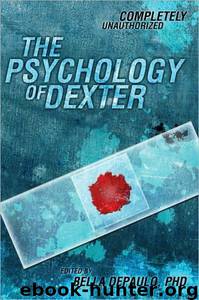The Psychology of Dexter by Bella DePaulo

Author:Bella DePaulo
Language: eng
Format: mobi
Tags: Non-fiction
ISBN: 9781935618331
Publisher: BenBella Books
Published: 2010-09-07T10:00:00+00:00
Jungian Psychology
According to Jung, a major component of the human psyche belongs to the collective unconscious—a storehouse of primordial knowledge, experiences, and images that are shared by all members of the human race. This volume of knowledge is unconscious, meaning that we do not have direct access to its contents. However, the collective unconscious still manages to find its way into our lives by indirectly guiding our behavior.
Jung believed that this indirect influence of the collective unconscious was most evident in a culture’s art, imagery, myths, and stories. Some of Jung’s ideas originated from his observation that the art and myths of various groups of people share surprising similarities, despite dramatic differences in culture and language. Jung labeled these templates “archetypes” and described them as “a kind of readiness to produce, over and over again, the same or similar mythical ideas.”
When our human ancestors repeatedly endured the same experience, the emotional reaction to that experience was imprinted onto our collective unconscious and eventually an archetype was formed for that particular experience. Once formed, an archetype serves as a mythical tendency, a predisposition to respond to events in a particular way. And since these archetypes are universal, they exist in storytelling from all eras. For example, the classic “hero’s journey” is seen across culture and time, from Homer’s Odyssey to James Cameron’s Avatar. Although each culture’s specific myth is unique, most myths share a few basic character templates or archetypes.
Jung spent much of his professional life identifying and defining the various archetypes commonly seen in mythology, art, and dreams. Although there are likely an infinite number of archetypes, only a handful appear most frequently. When it comes to stories about the struggle between good and evil, three major archetypes are often present, and it is the relationships between these three characters that form the story’s foundation. These characters are the Hero, the Shadow, and the Wise Old Man. For example, in the Star Wars series, the majority of the storyline focuses on Luke Skywalker (Hero), his nemesis Darth Vader (Shadow), and Luke’s mentors Obi-Wan Kenobi and Yoda (Wise Old Men). And in the more recent Harry Potter series, the story focuses primarily on Harry (Hero), his nemesis Lord Voldemort (Shadow), and Harry’s mentor Dumbledore (Wise Old Man). Dexter also employs this tripartite of archetypes, although the series puts a unique spin on the relationships between these characters, especially when it comes to the Shadow and the Hero.
Download
This site does not store any files on its server. We only index and link to content provided by other sites. Please contact the content providers to delete copyright contents if any and email us, we'll remove relevant links or contents immediately.
| Direction & Production | Genres |
| Guides & Reviews | History & Criticism |
| Reference | Screenwriting |
| Shows |
Robin by Dave Itzkoff(2440)
Head of Drama by Sydney Newman(2302)
I'm Judging You by Luvvie Ajayi(2203)
The Paranormal 13 (13 free books featuring witches, vampires, werewolves, mermaids, psychics, Loki, time travel and more!) by unknow(2099)
Ten by Gretchen McNeil(1887)
Single State of Mind by Andi Dorfman(1816)
#MurderTrending by Gretchen McNeil(1658)
Key to the Sacred Pattern: The Untold Story of Rennes-le-Chateau by Henry Lincoln(1634)
Merv by Merv Griffin(1613)
Most Talkative by Andy Cohen(1592)
Notes from the Upside Down by Guy Adams(1474)
This Is Just My Face by Gabourey Sidibe(1469)
The Hunger Games: Official Illustrated Movie Companion by Egan Kate(1440)
Binging with Babish by Andrew Rea(1418)
Springfield Confidential by Mike Reiss(1416)
Jamie Oliver by Stafford Hildred(1390)
The TV Writer's Workbook: A Creative Approach To Television Scripts by Ellen Sandler(1348)
Clarkson--Look Who's Back by Gwen Russell(1342)
Blue Planet II by James Honeyborne & Mark Brownlow(1284)
